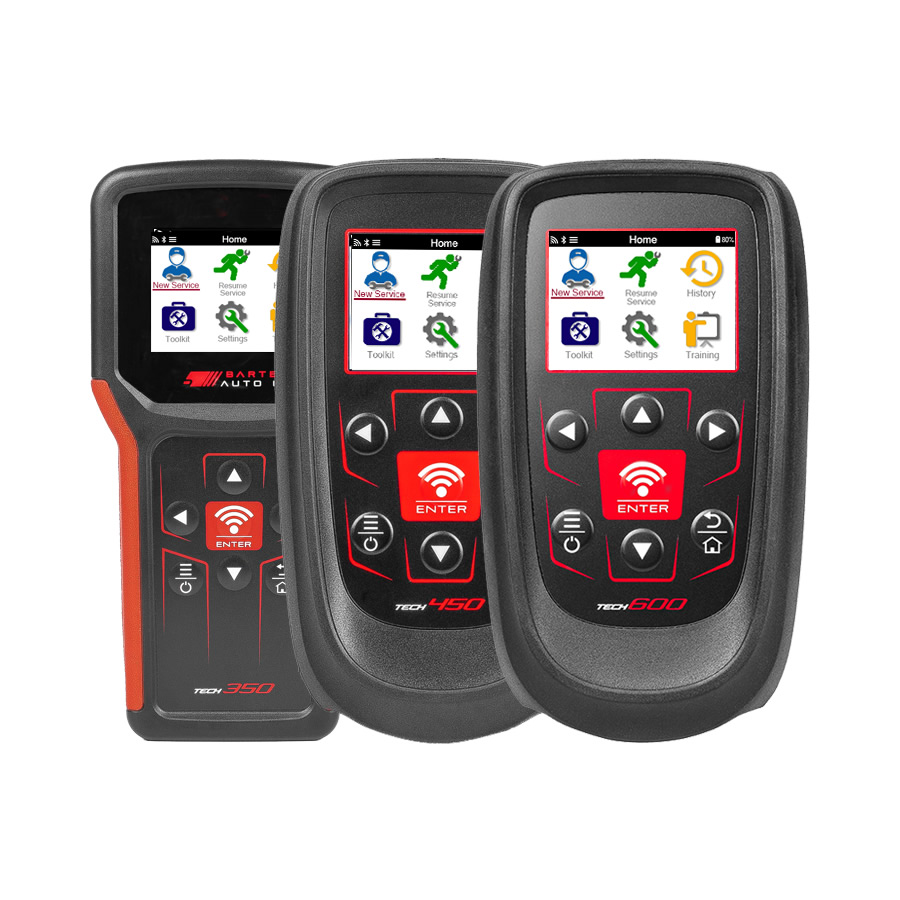Tyre Pressure Monitoring
A Tyre Pressure Monitor or Sensor can be of the direct or indirect type according to legislation. In practice most OEs (Automotive Original Equipment) have opted to install direct TPMS in their new builds. A direct TPMS uses a physical pressure and temperature transducer which is usually either valve stem mounted or banded to the wheel and transmits real time tyre pressure information to the driver of the vehicle either via a dashboard display or a warning light.
The sensors are manufactured by international companies such as Pacific, Schrader, Continental, formerly VDO Siemens and Huf, formerly Beru. There is no common technical standard (physical, electrical or software protocol) for the sensors and the OE's and suppliers have generated a multitude of sensor designs.
The OEs have made great efforts to fit the sensors in the plants to ensure they are at the correct angle when fastening, and are correctly torqued using a dynamic torque wrench to ensure that they seal and retain that seal, however, these practices have not yet been adopted in the aftermarket servicing of the TPMS. The OEs also carry out many electrical tests of the TPMS which have not yet been put into practice in the aftermarket to ensure that systems are properly set up before the vehicle leaves the dealer or tyre shop.

Tyre Pressure Monitoring Frequency
The sensors transmit data at UHF such as their unique sensor ID, temperature, pressure, battery life (where applicable) and other diagnostic information. This data is sent to the Engine Control Unit (ECU) or specific receiver on the vehicle. Those vehicles which have graphical displays of the sensor positions can then identify which wheel position has a problem.
This UHF transmission can occur at periodic intervals whilst the vehicle is in motion, immediately and continuously if an under pressure condition occurs or can be forced by a TPMS tool. The TPMS tool is required to force the sensor to transmit if it is being serviced and hence stationary.
The typical variations in sensor electrical technologies include Low frequency (LF) activation using continuous wave, modulated wave 125kHz (or 309MHz) transmissions. Also some sensors require a forced change in pressure to activate. There are significant variation in LF activation power levels and tolerances. Most sensors have different modes for test, plant use, transport/storage, drive etc. These are all activated using different LF datagram patterns.
The activation of the TPMS prompts a UHF response which can vary according to make/model/year of vehicle and sensor type. There can be a significant variation in the data content transmitted by the sensors from different manufacturers and for different make/model/year of vehicles.
The frequency (315MHz, 433MHz etc), modulation (AM, FM), communications protocol (Manchester, pwm), power level (low power for Japan and other Asian countries) are just some of the variations in the UHF output. Specific OE Tyre Pressure Monitoring information on Asian, USA & European automobiles can be found on our dedicated Tyre Pressure Monitoring Support OE websites, as for example www.toyotatpms.com and www.fordtpms.com
Bartec tools have the capabilities to work with all known OE approved sensors with all of the known variations. Our work in implementing and testing TPMS in Wheel & Tyre plants and car plants worldwide supports our market leadership for the long term and ensures that the software is reliable and proven.
As for the introduction dates of TPMS and a bit of history, there was a two year phase-in schedule starting from November 1st 2012. Article 13.1 to 13.4 of the adopted text stated that all vehicles type approved after this date must install a TPM System. Furthermore all newly registered vehicles after November 1st 2014 had a fully functioning Tyre Pressure Monitoring System (TPM System).